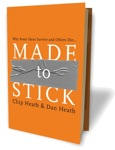 How would you like to give clarity to your routines, so that they're easier for your audiences to understand and remember?
How would you like to give clarity to your routines, so that they're easier for your audiences to understand and remember?
The trick is to make it concrete, less abstract.
When Aesop decided to record a set of morals, it would have been all too easy to simply list the moral ideals themselves. He knew that to make them easier to understand and remember, he would need to tell concrete stories. Instead of simply saying, “Misery loves company,” he gives us the story of The Fox Who Lost His Tail. Instead of Aesop's List of Moral Ideals, which probably would be long forgotten, we have Aesop's Fables, which has spanned both countries and centuries!
If you look over my memory and memory feat posts, as well as the various memory systems themselves, you'll note that the underlying technique is to find a way to make abstract concepts easier to visualize.
Numbers are the ultimate abstraction. In the Number Shape System, numbers are turned into pictures of items like a tire, a candle, or a swan that are easier to picture, and in the Number Rhyme System, they're turned into items that sound like the number, such as gun, shoe, and tree. Even in the more complex Peg/Major System, where each digit is turned into a phonetic sound, and the sounds are then combined to make words, you're advised to limit yourself to words that are nouns or verbs.
Why the limitation to nouns and verbs? What makes them, or anything else for that matter, more concrete? The answer is surprisingly simple. Something is concrete when you can experience it through at least one of your five senses (vision, hearing, touching, smelling and tasting). Our brains are specially designed to bring in information about the world through these pathways, so any concept that employs our senses can be quickly grasped.
Think about it. What is the definition of beauty? That is an abstract concept, because it is next to impossible to describe through the use of the senses. How about if I ask you the definition of, say, garden hose? That's much easier! It's a flexible tube for conveying a liquid, as water, to a desired point. You can picture the tube and the water easily. You know what flexibility feels like.
What effect can being more concrete have in magic presentations? Watch Eugene Burger perform Inquisition:
Did you notice the sensory detail in this routine? When the torture device is prepared behind the victim's back, you can imagine the beads of sweat. You can feel the torture device being pressed against your spine, and many even wince when the cards are torn, as you're hearing bones breaking! To see the difference concreteness can make, turn the sound off, and watch the video again. While you can still see some of the attitude in Eugene Burger's face, it is actually a completely different experience!
If you want to learn more about developing concrete magic presentations, the current masters of this style of presentation that first come to my mind are (There are, of course, many more current and past masters, as I will no doubt be reminded in the comments):
* Eugene Burger
* Robert Neale
* David Parr
* Docc Hilford
As a matter of fact, Docc's DVD, How to Turn Ordinary Tricks into Mind-Shaking Miracles, deserves special mention here. This DVD will show you not only how to make your own presentations more concrete, but how to use sensory detail to such great effect that you can have people remember much more happening that you actually performed! As an example, Docc performs a few simple effects with matches, yet the audience leaves with a memory of him performing a classic spook show, including decapitations, cremations, levitations and vanishes!
Lack of concreteness is also a major cause of lack of communication. What if a doctor tells a mother that her child has, say, Xeroderma pigmentosum? She (like most of us) probably wouldn't have the first idea what could be done, or what is involved. Instead, the doctor would tell the mother that, due to a rare genetic condition, her child cannot be exposed to direct sunlight, without risking skin cancer. However, putting the vivid description into the child's medical file for other doctors and nurses to read would also cause confusion. In the case of the medical records, it's much more efficient and effective to just use the phrase Xeroderma pigmentosum.
In short, abstract concepts are great when experts are talking to other experts. However, you should also remember, as Will Rogers said, “There is nothing so stupid as an educated man, if you get off the thing that he was educated in. ” Actually, it's not that non-experts are stupid, but rather that you need to make your case easier to understand and remember by getting them across in vivid sensory detail. Fans of the show Numb3rs will instantly recognize Charlievision as a great example of this idea.
If you want more of your audience to understand and remember your routines, present them in vivid detail. For more on the power of concrete ideas, check out the concreteness category of the Made To Stick blog.
See also:
Memorable Magic: Simplicity
Memorable Magic: The Unexpected




No Response to "Memorable Magic: Concreteness"
Post a Comment